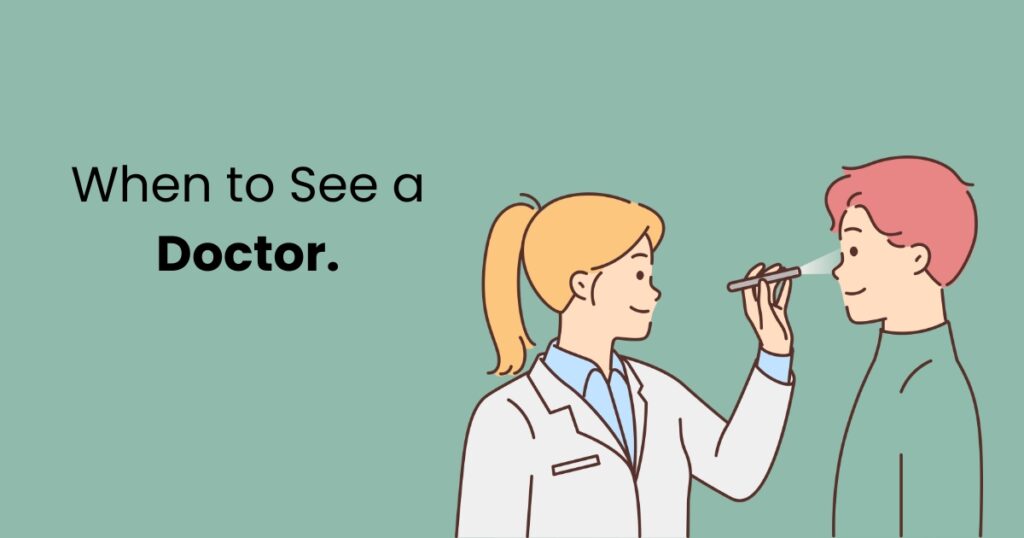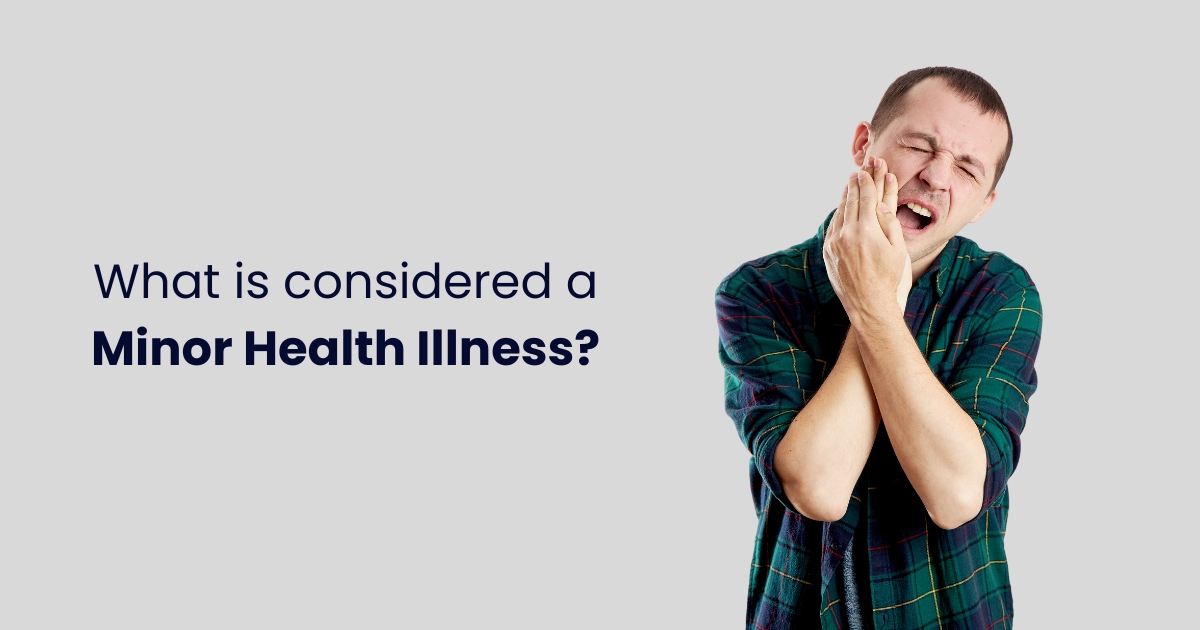Many health minor illnesses, that is as floating ailments arise before forfeiture critical problem may contain or possible if it dribble within individually a few days. Most of these conditions are transient, treatable with simple remedies and do not merit elaborate medical intervention or hospital admission. Learning more about what is classed as a minor health illness, recognising symptoms and knowing how to deal with them in an appropriate way may help individuals take back control of their own health saving on pointless trips to the doctors surgery. In this article, we take a closer look at some minor health illnesses and talk about their symptoms, causes as well treatment.
Everyday Minor Health Problems.
Common Cold:
A common cold is the most widespread minor health problem throughout the world! It is viral in nature and the most common cause are rhinoviruses. Symptoms may include a runny or stuffy nose, sore throat, coughing and occasionally mild fever. Fortunately for us, colds are typically mild and go away in 1 – 2 weeks. Symptoms may be relieved by over-the-counter (OTC) medications, bed rest, and additional liquids.

Headaches:
Digestive problems most of us could relate to, such as indigestion (dyspepsia) and heartburn are two major common issues that we experienced once a while. Symptoms of indigestion include a pain or burning sensation in the upper abdomen, functional dyspepsia (a chronic disorder with no known cause), eructation, bloating and feeling full earlier than expected after eating. While heartburn refers to a burning feeling in your chest, acid reflux or GERD involves some of the contents from the stomach rising back up into the esophagus. The main factors that up are overeating, eating spicy and fatty food or lay down after you’ve been eat. Symptoms can be managed with antacids, eliminating trigger foods and lifestyle modification.
Coughs:
Coughing is a sudden and reflex action that you do to clear your airways of mucus, irritants, or allergens. A cough is a common symptom of upper and lower respiratory tract conditions, but it is typically harmless especially if due to cold or another minor infection. I’m talking about the kind that tonsil stone coughs are, in general this not a chronic problem and is self limiting though it certainly can be uncomfortable at times. Symptoms can be relieved by drinking plenty of fluids, taking cough syrups or lozenges and using a humidifier.
Constipation:
Constipation is a very common condition that refers to having one or more of the following symptoms: fewer than three bowel movements per week, straining during a bowel movement at least 25% of the time, hard stools on over %0% of defecations and feeling as if you have an incomplete evacuation. That can bring you some discomfort and bloating. Main causes of constipation include an unbalanced diet, dehydration, lack of exercise and specific medications. Eating more fiber, drinking enough water and daily activity can help prevent constipation. Laxatives may be prescribed in some cases, but only under the care of a healthcare professional.
Minor Skin Irritations:
Minor skin irritation like rashes, insect bites or mild allergic reactions are relatively normal and not that serious. They can be itchy, painful and red. A lot of times, these problems are typically brought on by irritants and allergens or bug bites. Symptoms can be managed with topical creams, antihistamines and by avoiding the irritant.
Nasal Congestion:
Nasal congestion (also referred to as a blocked or stuffy nose) occurs when the tissues lining your nose become swollen because of inflamed blood vessels. It may result from a cold, allergies or sinus infections. Although nasal congestion can be irritating, it is rarely serious. The use of nasal decongestants, saline sprays and steam inhalation are some of the usual ways that a physician would recommend to patients suffering from rhinitis.
Mild Fevers:
A sore throat is a short-term minor illness that can cause the pain, scratchiness or irritation in your pharynx. It is usually associated with a viral infection, like the cold or flu and might be accompanied by coughing, congestion and sometimes fever. Home remedies for a sore throat: Warm salt water gargle, Throat lozenges and staying hydrated.
Minor Cuts and Bruises:
Because simple lacerations and minor bruises are two of the most common injuries, but they usually heal on their own. While cuts are like little nicks in the skin, bruises arise from an injury that allows blood to accumulate underneath. To avoid infections, and help expedite recovery, make sure your wound is cared for which each step cleansed with an antiseptic. Unlike in more serious medical conditions, bruises usually heal on their own unless cold compress is needed to alleviate pain and swelling.
Common Health Concerns.
Some factors which can result in minor health illnesses are listed below:
Viral Illnesses — one of the most minor symptoms that probably won’t build up to intensify conditions, for example:
A runny or blocked nose. They are typically self-limiting, and antibiotics are not warranted.
Allergens:
An allergy to pollen, dust, pet dander or specific foods can result in minor aggravations like hay fever, skin rashes and nasal congestion.
Environmental factors:
Weather changes, pollution and other irritants cause headaches, coughs or skin inflammations.
Your Lifestyle:
Eating wrong food, not exercising enough; dehydration and excess stress too can lead to indigestion, constipation or headaches.
Physical Trauma:
Injuries that occur with no involvement of external means are generally mild and can range from open wounds, injuries sustained during training.
Symptoms and Diagnosis.
Common minor health illnessesThere are many common examples of minor conditions where individuals may not seek medical attention for.
Headaches, muscle pain or difficulty swallowing/chest and abdominal pains for the involved areas.
Infection:
In conditions such as when you have a minor skin rash or are experiencing nasal congestion, swelling (inflammation), redness and irritation can occur.
Digestive Problems:
Symptoms include issues like bloating, indigestion or constipation which are generally related to minor complaints with the digestive system.
Symptoms of respiratory illness (cough, sneeze, nasal congestion):
Common with a simple cold.
Fatigue:
Many minor illnesses, especially during viral infections may include a symptom of fatigue.
Minor ailments are largely diagnosed via physical examination and through eliciting symptoms. Symptoms are often sufficient to diagnose the condition, and no further tests may be necessary. But if sympytoms don’t go away or get worse, your healthcare provider might recommend more tests to find out the cause.
Treatment and Management.
There are solutions and lifestyle changes that can usually be taken at home for most minor health illnesses. The following are a few general guidelines for the treatment and management of these conditions :
Rest, Resting:
It was rest the body has to have time for itself. Because the immune system is at war with an infection and conditions like a cold, it’s especially important to get rest.
Keep yourself hydrated:
It is important to stay plenty of fluids, especially in cases when you have fever either it might be cold or indigestion and coughs. You can reduce some symptoms and promote recovery by sipping water, herbal teas or clear broths.
Over-the-Counter Drugs:
Available for purchase without a prescription, such And any other medications you could buy at the store like pain relief, antacids and decongestants can be taken that will give a reprieve to some of the manifestations. Remember to take within the normal range quantity and seek consultation from your healthcare provider if you are having any concerns.
Home Remedies:
There are home remedies available to treat minor illness. When your body becomes weak, there are certain natural remedies that will make you feel better — honey and lemon in warm water for a sore throat or ginger tea to help with nausea, indigestion.
Preventing Triggers:
The first step to illness prevention is recognition of the causes and then staying away from those triggers such as foods, allergens or stressors that might cause indigestion, headaches or even skin problems.
Correct Wound Care:
In cases of small cuts and bruises, wash the wound with soap & water; use an antiseptic ointment or lotion on it before surrounding with a bandage to prevent infection.
When to See a Doctor:
However, many minor health conditions are not significant but sometimes medical attention is needed:

Chronic symptoms:
This means that the problem is not going away or seems to be getting worse over time. Any change in a persistent cough over three weeks or an unusual worsening of your headache, however would need to be further investigated.
A high fever:
A temperature that is above 100.4 F (38 C) and does not respond to medication or it goes viral, or comes with the following signs should be evaluated by a healthcare professional
Signs of Infection:
If a minor scratch or wound is increasing redness, swelling and warmth with pus in the middle we might need to see our doctors sooner as this may be an infection setting into.
Severe Pain:
If pain is moderate or severe, and does not respond to over-the-counter (OTC) medication like ibuprofen (Advil), you definitely need medical attention.
Conclusion
Everyone gets basic health ailments that are a part of life. Although these conditions are not serious, they can be irritating and interfere with normal activities. Knowing what causes minor health problems, the symptoms and treatments helps reduce unnecessary doctor’s visits and means you don’t have to suffer with them unnecessarily. While it may seem benign, if you have other symptoms or a more serious medical issue could be the cause of your fatigue then get yourself checked out. Proactively taking steps to manage minor illnesses is a step toward maintaining a healthy lifestyle and living the best life you can.

